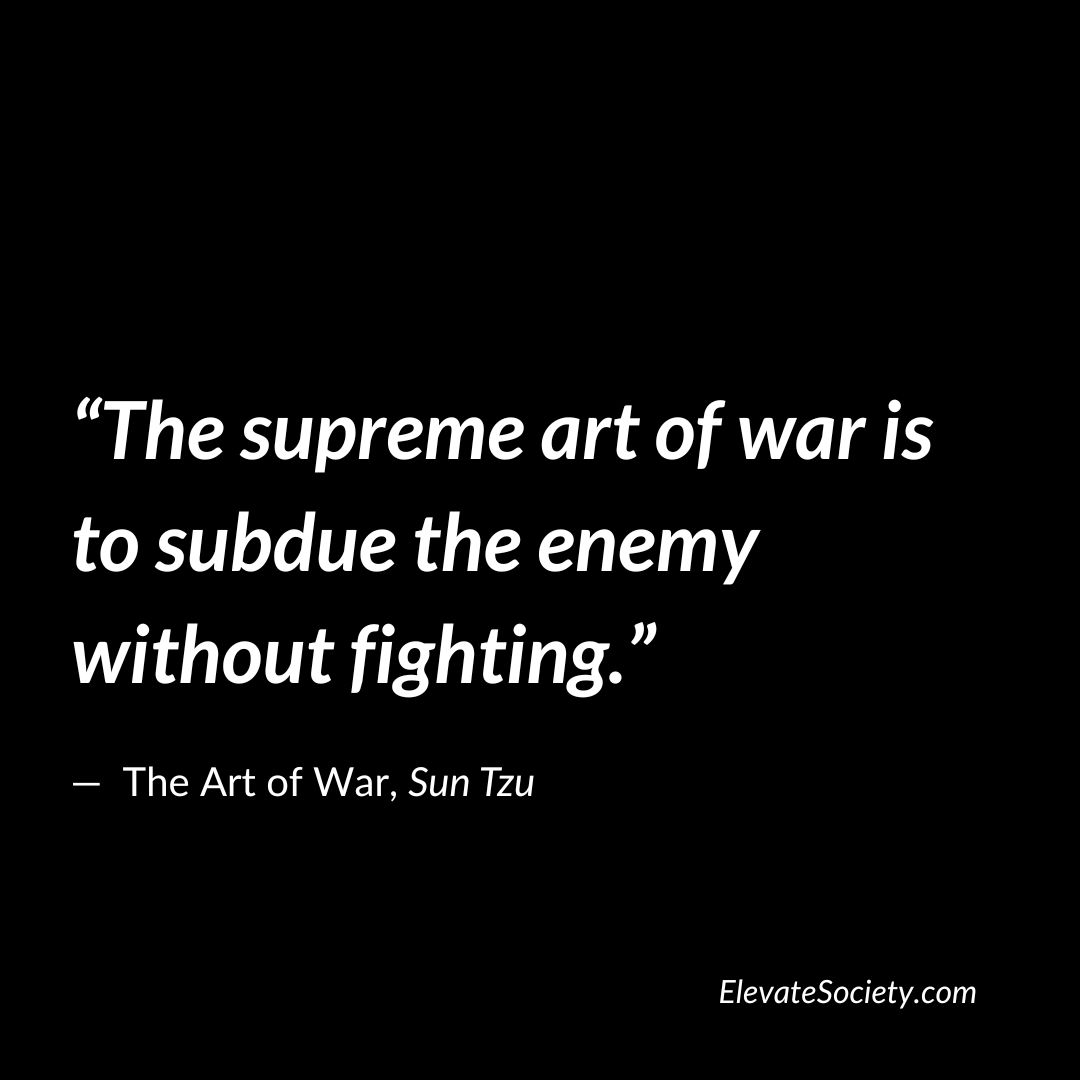The supreme art of war is to subdue the enemy without fighting.
What's the meaning of this quote?
Quote Meaning: The quote emphasizes the importance of strategy and diplomacy in conflict resolution. This quote suggests that the most effective way to win a battle is not through direct confrontation but through cunning, planning, and diplomacy.
By understanding the strengths and weaknesses of the enemy and finding ways to undermine them without engaging in direct conflict, one can achieve their goals while minimizing harm and conflict. This quote is a reminder that in any conflict, it's important to think strategically and consider all options before engaging in direct confrontation.
Who said the quote?
The quote, 'The supreme art of war is to subdue the enemy without fighting.' was said in the book The Art of War (Summary / Quotes) by Sun Tzu. Sun Tzu was a Chinese military strategist and philosopher who is best known for his book "The Art of War," which offers insights on tactics, strategy, and leadership.
What's the quote's message?
The quote speaks to the idea that the best way to win a war is not through direct confrontation, but rather by outmaneuvering and outsmarting the enemy. This concept is often referred to as "winning without fighting." Sun Tzu believed that the ultimate goal of warfare was not to just destroy the enemy but rather to defeat them with minimal loss. He believed that the best way to win a war was to avoid it altogether.
 Subduing the enemy without fighting requires a deep understanding of the enemy's weaknesses and strengths, as well as an intimate knowledge of the environment in which the conflict is taking place. Sun Tzu emphasized the importance of intelligence gathering and knowing the enemy better than they know themselves.
Subduing the enemy without fighting requires a deep understanding of the enemy's weaknesses and strengths, as well as an intimate knowledge of the environment in which the conflict is taking place. Sun Tzu emphasized the importance of intelligence gathering and knowing the enemy better than they know themselves.
Another key aspect of subduing the enemy without fighting can be the use of diplomacy and negotiation. In modern times, the concept of winning without fighting is often applied to politics and business as well. The idea is to achieve your goals through diplomacy, negotiation, and other non-violent means.
Is there a historical example that illustrates the message of the quote?
One historical example that illustrates this message is the Cuban Missile Crisis of 1962.
During the Cuban Missile Crisis, the United States discovered that the Soviet Union was installing nuclear missiles in Cuba, just 90 miles off the coast of Florida. Tensions rose quickly, and the world teetered on the brink of nuclear war. However, instead of resorting to outright warfare, President John F. Kennedy opted for a naval blockade around Cuba. This move applied significant pressure on the Soviet Union but did not constitute a direct act of war.
Kennedy's administration then engaged in intense negotiations with the Soviet Union, which were tense and often conducted behind the scenes. The negotiations were aided by each leader's understanding of the other's political situations and constraints. As a result of these diplomatic efforts, the Soviet Union agreed to remove the missiles from Cuba. In return, the United States pledged not to invade Cuba and later agreed to remove its own missiles from Turkey.
In this case, the 'enemy' was subdued without a direct military confrontation or fighting, demonstrating the 'supreme art of war' as per the quote. The Cuban Missile Crisis stands as an historical example of how strategic thinking, negotiation, and diplomacy can avert warfare and resolve conflicts, truly embodying the essence of Sun Tzu's timeless wisdom.
* Want to explore more inspiring quotes and their meanings? Head over to this quotes page and discover a treasure trove of motivational phrases.
Chief Editor
 Tal Gur is an author, founder, and impact-driven entrepreneur at heart. After trading his daily grind for a life of his own daring design, he spent a decade pursuing 100 major life goals around the globe. His journey and most recent book, The Art of Fully Living, has led him to found Elevate Society.
Tal Gur is an author, founder, and impact-driven entrepreneur at heart. After trading his daily grind for a life of his own daring design, he spent a decade pursuing 100 major life goals around the globe. His journey and most recent book, The Art of Fully Living, has led him to found Elevate Society.




















